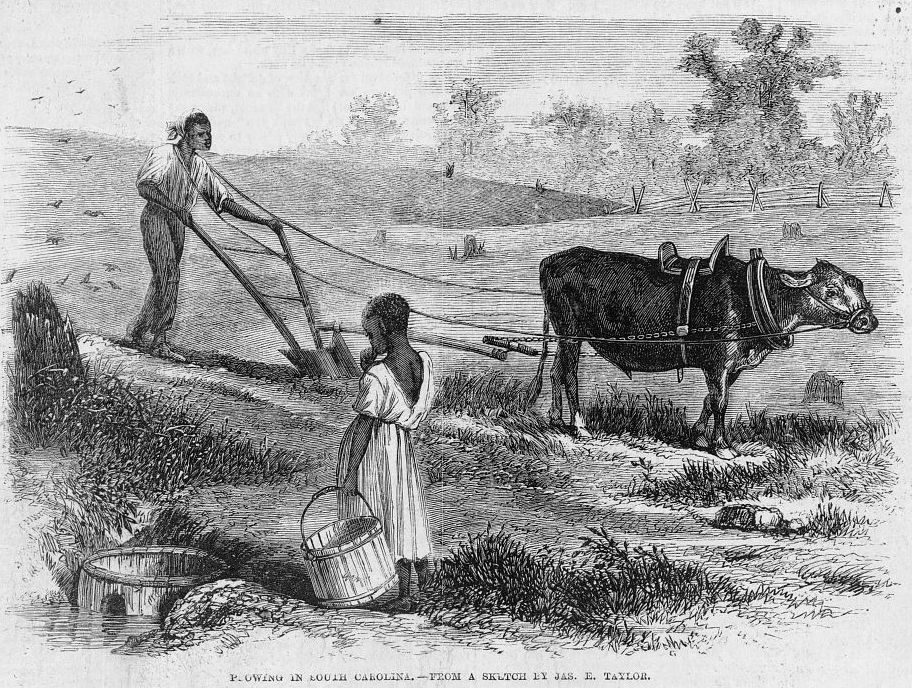To the Negro Farmers in the United States
By Alice Dunbar-Nelson
Annotations by Rene Marzuk

God washes clean the souls and hearts of you, His favored ones, whose backs bend o'er the soil, Which grudging gives to them requite for toil In sober graces and in vision true. God places in your hands the pow'r to do A service sweet. Your gift supreme to foil The bare-fanged wolves of hunger in the moil Of Life's activities. Yet all too few Your glorious band, clean sprung from Nature's heart; The hope of hungry thousands, in whose breast Dwells fear that you should fail. God placed no dart Of war within your hands, but pow'r to start Tears, praise, love, joy, enwoven in a crest To crown you glorious, brave ones of the soil.
DUNBAR-NELSON, ALICE. “TO THE NEGRO FARMER OF THE UNITED STATES,” IN THE DUNBAR SPEAKER AND ENTERTAINER, ED. ALICE MOORE DUNBAR-NELSON, 240. NAPERVILLE, ILL: J. L. NICHOLS & CO., 1920.
Contexts
The Dunbar Speaker and Entertainer‘s dedication reads: “To the children of the race which is herein celebrated, this book is dedicated, that they may read and learn about their own people.” In the foreword, Leslie Pinckney Hill, an African American educator, writer, and community leader who graduated from Harvard University in 1903, criticizes the one-sidedness of prevailing reading courses: “In vain may you search their pages—those pages upon which all our reading has been founded—for anything other than a patronizing view of that vast, brooding world of colored folk—yellow, black and brown—which comprises by far the largest portion of the human family.” Hill further writes that Alice Dunbar-Nelson’s book seeks to prove “that the white man has no fine quality, either by heart or mind, which is not shared by his black brother.”
Think of reading this poem out loud. Elocution (or public speaking) was a highly valued and widely taught skill in nineteenth-century America. In her introduction to the Dunbar Speaker, Alice Dunbar-Nelson offers some advice: “Before you begin to learn anything to recite, first read it over and find out if it fires you with enthusiasm. If it does, make it a part of yourself, put yourself in the place of the speaker whose words you are memorizing, get on fire with the thought, the sentiment, the emotion–then throw yourself into it in your endeavor to make others feel as you feel, see as you see, understand what you understand. Lose yourself, free yourself from physical consciousness, forget that those in front of you are a part of an audience, think of them as some persons whom you must make understand what is thrilling you–and you will be a great speaker.”
Definitions from Oxford English Dictionary:
moil: Toil, labour, drudgery.
Resources for Further Study
- After the Civil War (1861-1865) and the subsequent abolition of slavery, former slaves were notoriously promised “forty acres and a mule” as a compensation for their unpaid work during slavery. Ultimately, this attempted redistribution failed and by the end of the Reconstruction period (1865-1877) lands were returned to their previous white owners.
- A timeline of interactions between black farmers and the United States Department of Agriculture (USDA) from 1920 to 2021.
Contemporary Connections
A profile on John Boyd Jr., founder of the National Black Farmer’s Association, highlights the discrimination that Black American farmers still face today. According to the article, “the number of black farmers in America peaked in 1920,” at around the same time Dunbar Nelson’s poem appeared in print.